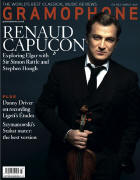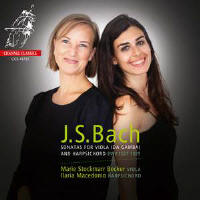Texte paru dans: / Appeared in: |
|
|
Outil de traduction (Très approximatif) |
|
|
Reviewer:
Mark Seow The album’s opener, Bach’s Sonata in G, BWV1027, is lovely. Marie Stockmarr Becker and Ilaria Macedonio perform the Adagio with daydreaming slowness. There’s an introspection to how the phrases unfold, and certainly there’s no rushing the pair. Becker’s last note – an unexpectedly long messa di voce – stills the listener for the following Allegro ma non tanto, in which the ma non tanto is taken rather seriously. But there are interesting consequences to this slowness: in clipping the wings off the counterpoint, the playing exudes melodiousness. Macedonio’s agogic touch, faintly bronzed in inégal, is excellent, and her fingerwork is spoken with a finely articulated grammar. The overall sound world is luscious, and the balance achieved by the team from Channel Classics is expertly judged. For some, this richly lyrical approach to Bach’s music might go too far, particularly in the Sonata in G minor, BWV1029. It takes repeated listenings to understand the duo’s interpretation: denseness and prosaically played-out sequences unhelpfully dissolve the work’s structures. I could do without the mosquito-like trills in the Vivace, as well as the propulsive bulges that blemish the duo’s otherwise excellent rhythmic vivacity. The Adagio is the least successful: Becker and Macedonio stray too far into meandering reverie and their aimlessness makes for awkward listening. Simply put, it’s much too slow for an 18th-century Adagio. I find the flowing footsteps of Antoine Tamestit and Masato Suzuki (Harmonia Mundi, A/19) preferable: theirs is an Adagio that wonders as it wanders. |
|




